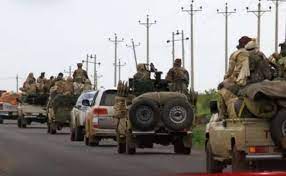The Sudanese Army Announces Its Intention to Lift the Siege of El Fasher and Halt the Advance of the Rapid Support Forces

The Sudanese army confirmed on Saturday its intention to lift the siege imposed by the Rapid Support Forces on the city of El Fasher, the capital of the Darfur region, which is witnessing intense battles and a worsening humanitarian crisis.
Media reports indicated that the Sudanese armed forces "halted the advance of the 'Rapid Support' in the southern axis in El Fasher." However, the city remains under constant threat, as "the outskirts of El Fasher are subjected to continuous artillery shelling" by opposing forces.
The report revealed catastrophic consequences of the siege and battles on civilians, stating that "most hospitals in El Fasher are out of service due to repeated shelling." It also warned of a deteriorating food situation, noting that "900,000 people are suffering from hunger due to the siege on El Fasher."
It is worth mentioning that the Rapid Support Forces have imposed a tight siege on El Fasher, which is the only remaining stronghold in Darfur still under the control of the regular army since May 2023. Attacks have continued for weeks amid international warnings about the consequences of storming the city, especially since it serves as the humanitarian operations center for the entire Darfur region.
For his part, a member of the Sovereignty Council and Deputy Commander of the Sudanese Army, Lieutenant General Shams al-Din Kabbashi, renewed the army's commitment to liberate the city. He confirmed in a speech from the front lines in Kordofan that "there is no negotiation with the 'Rapid Support' forces." Estimates suggest that Kabbashi's visit may accelerate the pace of battles in the Darfur and Kordofan regions, as part of the army's option for military resolution.
This escalation comes amid a civil war that has been raging since mid-April 2023, resulting, according to the United Nations and local authorities, in the deaths of more than 20,000 people and the displacement and refuge of about 15 million. An American university study estimated the death toll at around 130,000. The conflict has led to the division of Sudan into areas of influence, with the army controlling the north and east, while the Rapid Support Forces control most of Darfur and parts of the south.